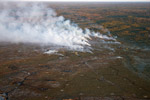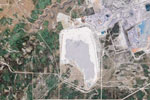View Larger Map
The tar sands as seen from Google Earth near Fort McMurray, Alberta.
Carrying signs that said ‘Stop Harper’s War on Knowledge’ and ‘Scientists Shouldn’t Wear a Muzzle,’ Canada’s scientists were unusually theatrical yesterday at a rally against the Canadian government’s cuts for basic science funding and environmental protections. Scientists, dressed in white coats, carried a coffin to represent “the death of evidence” in Canada, while a costumed grim-reaper led the way. According to police, around 2,000 joined in the protest.
“Scientists are generally not agitators, but this continuous set of decisions [by the Canadian government] has got very many scientists hot under the collar,” Scott Findlay, a rally organizer and ecology researcher with the University of Ottawa, told the CBC yesterday.
Scientists have expressed dismay over massive cuts to government agencies like Environment Canada, and Fisheries and Oceans Canada. In addition, the government has announced it is closing down the Experimental Lakes Area, a well-known 44-year-old research facility that looked at environmental issues from acid rain to mercury pollution. The government is also shuttering the Polar Environmental Atmosphere Research Laboratory (PEARL), which has been monitoring holes in the ozone and the impacts of climate change in the Arctic. The government earlier raised ire in the scientific community by forcing official monitors on scientists to ensure they didn’t go off script.
However, the Canadian government, led by Prime Minister Stephen Harper, has increased science funding in some areas, especially commercialization and applied research. For example the government is spending $105 million on forestry innovation and market development.
But, the scientist protestors say the government has chosen its cuts based on politics to thwart basic research and environmental monitoring.
“It’s not about saving money. It’s about imposing ideology,” Andrew Weaver, a climatologist with the University of Victoria, told the Guardian.
The Canadian government has openly thrown their full support behind the nation’s tar sands industry, a decision that has led to a deep rift between the government and environmentalists—a rift that now appears to be extending to usually apolitical scientists. Many say the cuts, which have been coupled with regulatory rollbacks, are a new method by the government to keep control of any scientific-based criticism of the tar sands and other big industries.
Last year Canada, which has become infamous at international negotiations on climate change for obstructionism, dropped the Kyoto Protocol.
Related articles
WWF: biggest villain at Rio+20 is Canada
(06/18/2012) Having sent a delegation to the United Nation’s Rio+20 Summit on Sustainable Development, the World Wide Fund for Nature (WWF), the world’s biggest conservation group, has recently declared their Heroes and Villains of Rio+20—so far. The NGO has strong words for the negotiating position of the U.S. and the major oil exporting countries (OPEC), but saves its harshest criticisms for Canada.
13 arrested for blockading coal train, including Nobel Prize winning economist
(05/07/2012) Thirteen Canadians were peacefully arrested this weekend for blockading Burlington Northern Santa Fe (BNSF) Railway train tracks in order to prevent the passage of coal stemming from the United States and destined to be burned in Asia. Among those arrested was Mark Jaccard, an economics professor with Simon Fraser University, who won the Nobel Prize for his work with the Intergovernmental Panel on Climate Change (IPCC).
Tar sands emit more carbon than previously estimated

(03/12/2012) Environmentalists have targeted the oil-producing tar sands in Canada in part because its crude comes with heftier carbon emissions than conventional sources. Now, a new study in the Proceedings of the National Academy of Sciences (PNAS) has found an additional source of carbon that has been unaccounted for: peatlands. Mining the oil in the tar sands, dubbed “oil sands” by the industry, will require the wholesale destruction of nearly 30,000 hectares of peatlands, emitting between 11.4 and 47.3 million metric tons of additional carbon.
TransCanada to build southern half of Keystone to avoid State Department approval

(02/29/2012) Keystone XL is becoming the project that refuses to die: TransCanada, the company behind the pipeline, has said it plans to build the southern half of the pipeline while it waits to determine a new route for the northern section. The company does not need approval from the State Department, which turned down the entire pipeline in January, to build the southern half from Texas to Oklahoma. However, the Obama Administration has embraced the idea. Carrying carbon-intensive tar sands oil down from Canada to a global market, the proposed pipeline galvanized environmental and climate activists last year, resulting in several large protests and civil disobedience actions.
Obama rejects Keystone pipeline, but leaves door open for tar sands

(01/18/2012) The Obama administration today announced it is scrapping TransCanada’s Keystone pipeline after Republicans forced a 60-day deadline on the issue in a Congressional rider. The State Department advised against the pipeline arguing that the deadline did not give the department enough time to determine if the pipeline “served the national interest.” The cancellation of the pipeline is a victory for environmental and social activists who fought the project for months, but Republicans are blasting the administration.